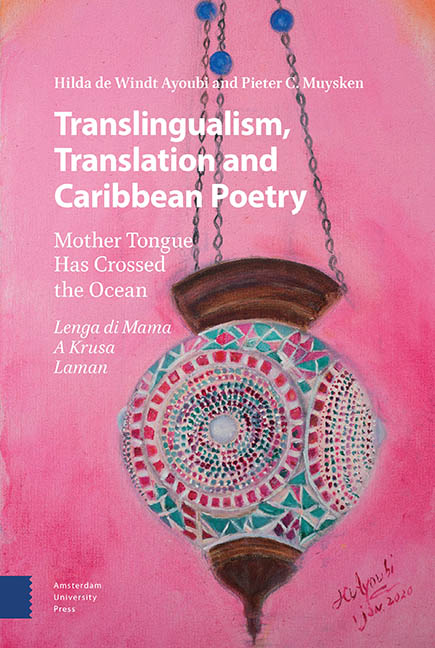Book contents
- Frontmatter
- Dedication
- Contents
- How to Navigate This Book: Kon Nabegá den e Buki akí
- Acknowledgements
- Preface
- Part 1 Introducing the Mother Tongue: Introdukshon di Lenga di Mama
- Part 2 The Poem “Lenga di Mama” and its Translations, Comments and Language Descriptions E Poema “Lenga di Mama” i su Tradukshonnan i Komentario i Deskripshon di e Idiomanan
- Part 3 The Poem “E ‘papiá’ di Papiamentu” and its Translations E Poema “E ‘papiá’ di Papiamentu” i su Tradukshonnan
- Part 4 The Poem “Papiamentu pa Semper” and its Translations E Poema “Papiamentu pa Semper” i su Tradukshonnan: The Translations and Editing of the Poem Hilda de Windt Ayoubi and Pieter Muysken (for Dutch)
- Part 5 The Poem “Riba Ala di Lenga di Mama” and its Translations E Poema “Riba Ala di Lenga di Mama” i su Tradukshonnan
- Part 6 Commentary: Komentario
- Note on the Authors: Informashon tokante e Outornan
- Index: Índise
Semitic Languages: Idioma Semítiko
Published online by Cambridge University Press: 15 September 2022
- Frontmatter
- Dedication
- Contents
- How to Navigate This Book: Kon Nabegá den e Buki akí
- Acknowledgements
- Preface
- Part 1 Introducing the Mother Tongue: Introdukshon di Lenga di Mama
- Part 2 The Poem “Lenga di Mama” and its Translations, Comments and Language Descriptions E Poema “Lenga di Mama” i su Tradukshonnan i Komentario i Deskripshon di e Idiomanan
- Part 3 The Poem “E ‘papiá’ di Papiamentu” and its Translations E Poema “E ‘papiá’ di Papiamentu” i su Tradukshonnan
- Part 4 The Poem “Papiamentu pa Semper” and its Translations E Poema “Papiamentu pa Semper” i su Tradukshonnan: The Translations and Editing of the Poem Hilda de Windt Ayoubi and Pieter Muysken (for Dutch)
- Part 5 The Poem “Riba Ala di Lenga di Mama” and its Translations E Poema “Riba Ala di Lenga di Mama” i su Tradukshonnan
- Part 6 Commentary: Komentario
- Note on the Authors: Informashon tokante e Outornan
- Index: Índise
Summary
Abstract
The Semitic language family is spoken in theMiddle-East and northern Africa, and is a branchof the much larger Afroasiatic language family. Itis historically very important since severalreligious traditions are transmitted in a Semiticlanguage, including Islam and Judaism. Althoughspeakers of some of the Semitic languages arepolitically divided, their languages are closelyrelated. The writing systems of the Semiticlanguages prioritize the consonants, while thevowels are either not marked at all or are markedwith small dots. In this book, translations intoArabic, Aramaic and Hebrew are included. All threelanguage names stand for a cluster of varieties,some ancient, some modern.
Keywords: Religious Tradition,Ancient Languages, Modern Languages, Middle-East,Aramaic, Hebrew, Arabic, Afroasiatic languagefamily
The word “Arabic” can be used as acollective name for a large number of varieties,spoken in a vast area from the Persian Gulf toMauritania, often alongside of other locallanguages. It is also the term for Modern StandardArabic (a standardized variety that developed in theArabic world over a hundred years ago) and ClassicalArabic (the language used in the Quran and textsfrom the same period). The latter two varietiesdiffer mostly in vocabulary, and for Arabic speakersare variants of the same language. The identityconveyed by the term “Arabic” is so strong that itoverrides the many linguistic differences betweenthe varieties of the language. The written versionof the language is mostly the standard variety. LikeHebrew, Arabic is a Semitic language and it belongsto the Afro-asiatic language family. The Arabicscript dates back to the fourth century CE, and isalso used for many other languages in countries witha strong Islamic tradition. The Qur’an has beeninstrumental in giving shape to the extremely richArabic literary tradition, which covers many genres:poetry has been very important, as well as religiousstudies, surprisingly many cookbooks, but alsoplays, novels, and scholarly treatises. Only a smallpart of this tradition is known in the West. As isalready apparent from the writing system, words arecharacterized through their consonants, and vowelsadded for extra information.
- Type
- Chapter
- Information
- Translingualism, Translation and Caribbean PoetryMother Tongue Has Crossed the Ocean, pp. 225 - 238Publisher: Amsterdam University PressPrint publication year: 2022



